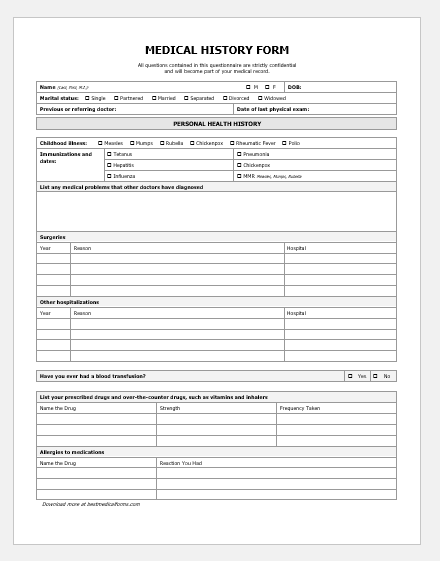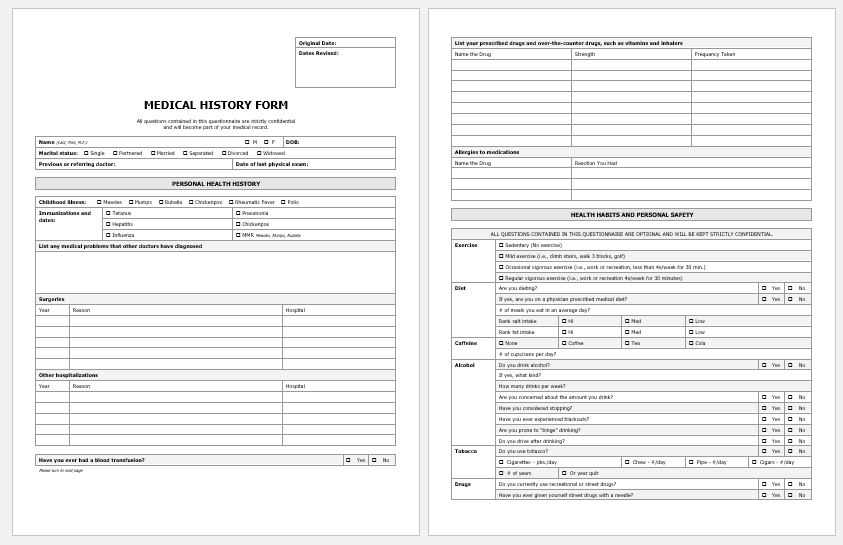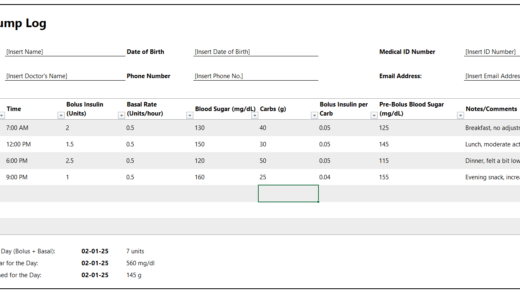A patient walks into a doctor’s room and is asked certain questions which help his doctor to reach certain diagnoses and plan his management. These simple questions are called as “medical history” of the patient. During medical studies, students are repeatedly advised to master the art of taking medical history because this is the first step in the ladder of reaching diagnosis and treatment.
When and where medical history form is used
A medical history form is used in both outpatient and inpatient departments in a clinic or hospital. Every time a patient comes, his medical history form is filled either by the nurses or the doctor himself. By having a glance at the history form, one can get a great deal of information on health conditions at present and in the past along with some other important details.
Parts of a Medical history form
Like any other medical form, it starts with the name of the doctor and the pharmacist as some information about the drug has to be mentioned in the form. In some cases, the registration number of doctors and pharmacists is also required.
Medications
The first portion of the form includes medication history. In this table, we provide all the detail of the medications used by the patient in the past as well as all drugs being taken by him now. It has to be filled very carefully just like all other medication forms. The name of the drug is written carefully and accurately. A complete dose and frequency of drugs are also mentioned. The route of administration should ideally be mentioned too.
The starting date and time of the drug and when it ended, all details are mentioned. The doctor’s name who prescribed the medicine is also mentioned along with the reason for the administration of the
History of surgical procedures
The second component of a patient’s medication history form is the history of surgical procedures performed on the patient. They are mentioned in chronological order with complete information. The date of the surgical procedure, the name of the procedure, the name of the surgeon, and the hospital where it was performed are all mentioned in the form. Doctor’s notes are also written at the end to tell some major details of the procedure including diagnosis and per-operative findings.
History of Major Illnesses
The history of major illnesses is also a very important part of a medical history form. This includes any chronic major systemic illness for example diabetes, hypertension, hypothyroidism, hyperthyroidism, cholelithiasis, carcinoma, or any congenital disease. Everything is mentioned about when it started, who treated it, and when did the disease ended by taking which medications. If the illness is still going on, necessary details are added about that also.
History of vaccination
Human beings are susceptible to a lot of infectious and fatal diseases right from birth. Luckily, medical science has devised vaccination against many of these diseases and made it mandatory for the government to make sure all individuals are vaccinated against the most common and most fatal infectious diseases.
Some of them are tetanus, diphtheria, pertussis, hepatitis B, meningitis, polio, and influenza. In this portion of the history form, we mention whether the individual is vaccinated against these illnesses or not.
The templates
Short form

Detailed form -4 pages



